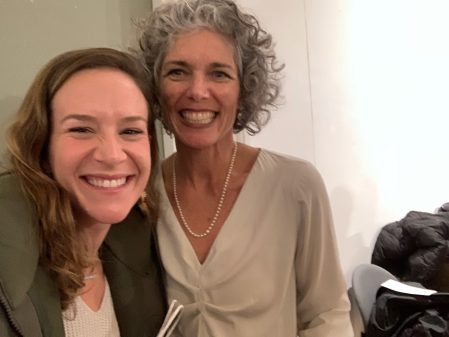
Stories are the work of a community, not a creator in isolation. I am struck by this truth every single time I hold my debut picture book, Gitty and Kvetch, illustrated by the phenomenal Ariel Landy (Atheneum, 2021), in my hands. Its pages carry the fingerprints of all the people who have poured into my life and this story. Each character, every turn of a phrase, any attempt at a laugh or tender moment… It’s all a reflection of the friends and family who have shaped my understanding of the world.
Any focus on a single creator not only reinforces our individualist culture, but also risks missing the heartbeat of a story!

It turns out that I tend to sequester myself in a deep, dark, quiet cave when drafting. This can be a beautiful place. It can also, unsurprisingly, be an isolating one. But the revising! Ah, the revising! There is nothing more reassuring than feeling so stuck you’re sure there is no way out… and then remembering there are people waiting in the wings to offer their light.
These are the generous, light-shedding humans who offered a safe space to be vulnerable with ugly drafts and uglier doubts. They offered creative solutions and wise guidance. And, perhaps most importantly, they made me cackle with laughter when my own intensity was getting the best of me! I’m honored to share the many ways Gitty and Kvetch truly is the work of a community with you here.
“Gitty”: Gitty’s original name was “Meli,” a tribute to my effervescent grandpa Mel and the Samoan word for honey. After struggling to find a name that more clearly mirrored Kvetch’s, I threw the renaming challenge to my parents. They called me after an afternoon of researching our family tree: “You ready for this? How about “Gitty,” your great aunt Gittel’s nickname! We’re giddy just thinking about it! Did we nail the assignment or what?” Yup, they sure did.
Yiddish Translations: Paula Teitelbaum, Yiddish linguist and expert, generously (and patiently!) provided a masterclass in Yiddish transliteration systems. Paula helped me grapple with when to use the Germanic “ch” convention, like in “Kvetch,” and when to stick with the standard YIVO system, like in “shlep.”

Jewish Representation: I believe casual Jewish representation is a powerful way to instill self-acceptance and pride in Jewish readers, not to mention promote visibility to non-Jewish readers. That said, by the time the manuscript went off for final copy edits, Yiddish was the only signifier of Gitty and Kvetch’s Jewish identities. It wasn’t sitting right with me, but I worried it was too late to make a change. I shared this regret with my boundlessly creative lifelong friend, Kit Garton, who suggested reimagining Gitty’s room to include proud Jewish symbols and references. Gitty’s Magen David and Hebrew name are now some of my favorite details from the book!

Kvetch’s Motivations: I shared an early manuscript with my Kvetch-like older brother to get his take. Eric helped me realize that Kvetch isn’t a grumpy pessimist at all! Instead, our beloved bird is a practical realist who’s genuinely interested in protecting those he loves. This compassion-filled reframe led to me to amp up Kvetch’s loyalty as a key counterbalance to his curmudgeonliness.

Surprise Ending: My first approach to the ending was falling flat. In my future editor’s revise and resubmit request, Alexa Pastor included a list of suggested approaches to get my wheels turning. None of them felt just right, but I worried that moving in a different direction might lessen my chances of selling the story.
The ever-wise Liz Garton Scanlon gave me the exact right advice: “You never want to compromise yourself, your truth, or the heart of your story for an editor, but you do want to remain receptive, curious and experimental!” It helped me capitalize on the spirit of the editorial suggestion in order to open myself up to the current ending.

Kvetch’s Owie: I tried everything under the sun to ramp up the tension within the story, but felt monumentally stuck. That is, until Garrett Werner, masterly writer and college bestie, shared his insights. What if Kvetch had been burned on a previous adventure? It would help motivate his crankiness and underscore his resistance to go on this particular romp to their perfect, purple treehouse. It also paved the way for the new, now much more earned, ending.
“Beak-areful”: This pun came straight from the brain of my brilliant friend and creator extraordinaire, Molly Mitchell. On top of gifting me with this delightful one-liner, Molly also peppered the manuscript with pump-ups like this one: “I LOVE GITTY! I’m like, get it girl, live in all your beautiful— although at times inaccurate— splendor.” Molly makes everything better, including this story.

So, if you’ve now come to view my sole author credit as an offensive bit of fraud: I wholeheartedly agree! Stories are the work of a community. It serves as an important reminder to open myself up, rather than close myself off, throughout the revision process.
Cynsational Notes

Caroline grew up as the youngest of four children in Dallas and spent her childhood sneaking extra helpings of noodle kugel from her bubbe’s kitchen. She moved to California for college and has spent her career working across education, everything from teaching brilliant third graders to helping develop federal policy.
Caroline is currently an MFA Candidate in Writing for Children and Young Adults at Vermont College of Fine Arts. She recently released her debut picture book Gitty and Kvetch (Atheneum Books for Young Readers) and is excited to share more about two upcoming, currently unannounced picture books soon. Caroline lives in Palo Alto with her husband (Tavita), two kiddos (Afi and Manu) and their 120-lb dog (Misha).

